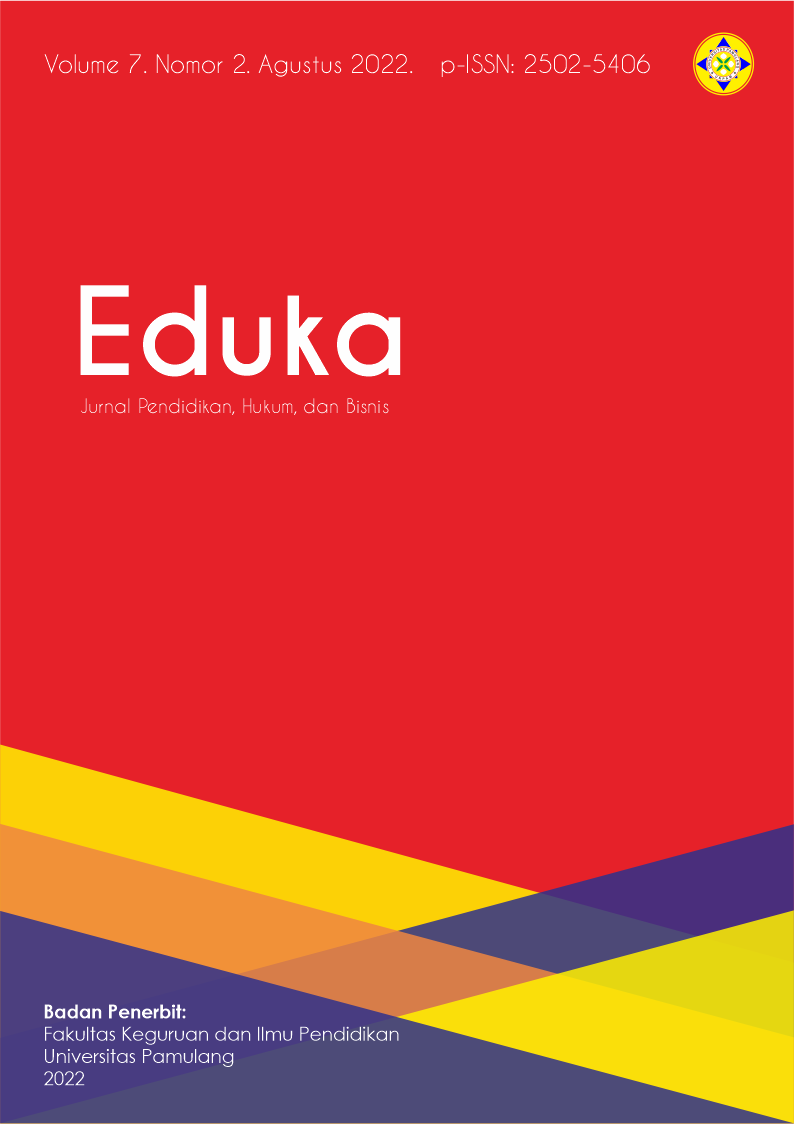Group Investigasi (GI): Model Pembelajaran Kooperatif untuk Peningkatan Hasil Belajar Siswa
DOI:
https://doi.org/10.32493/eduka.v7i2.26231Abstract
ABSTRACT
This study aims to prove a significant difference in the learning outcomes of class XI IPS before and before students use the group investigation cooperative learning model at MA Al-Muhtadi. This study uses a quantitative approach with a quasi-experimental research method and the design used is One group pretest-posttest design. This study uses a quantitative approach, in this case students act as research objects. In this study data collection using pretest and posttest. The results of this study are, the results of studying Economics before using the group investigation type cooperative learning model obtained an average pretest of 52.30 while after using the group investigation type of cooperative learning model the posttest average was 73.30. Based on the average posttest results, learning using the group investigation type cooperative learning model has better learning outcomes. Based on the t-test Paired Sample T Test, in this study, the output of the Paired Sample Test was obtained with a value of sig 0.00 <0.05, which means Ha was accepted, so it can be said that there is a significant effect of the group investigation type cooperative learning model on student learning outcomes in the eyes economics class XI IPS at MA Al-Muhtadi.
Keywords: Cooperative Model; Group Investigations; Learning outcomes
References
Anggraeni, D Tri. dan Wulandari, R Wahyu. 2020. Penerapan Model Group Investigation Pada Mapel Pendidikan Kewarganegaraan Journal of Primary Education, Vol. 1 No.1
Asriningtyas, A Nandhita., Kristin, F., dan Anugraheni, I. 2018. “Penerapan Model Pembelajaran Problem Based Learning Untuk Meningkatkan Kemampuan berpikir kritis siswa dan hasil belajar matematika siswa kelas 4 SD†Jurnal Karya Pendidikan Matematika. Vol. 5 No.1 Hal 23-32. (diunduh 18 September 2021)
Khoirunisyah, S., Purwanti, E., dan Puteri Yanuarita., 2017 “Keefektifan Model Pembelajaran Group Investigation Terhadap Hasil Belajar Siswa†Jurnal Kreatif. Hal 73-80. (diunduh 10 September 2021)
Irawan, F, Jefri dan Ningrum (2016) “Pengaruh Penggunaan Model Cooperative Learning Tipe Group Investigation (GI) Terhadap Hasil Belajar Prakarya dan Kewirausahaan (PKWU) Siswa Kelas X Semester Genap SMK Negeri 1 Metro TP 2015-2016†Jurnal Pendidikan Ekonomi Metro. Vol.4. No.2 Hal 61-68. (diunduh 10 September 2021)
Shoimin, Aris. 2014. 68 Model Pembelajaran INOVATIF dalam Kurikulum 2013. Yogyakarta: AR-RUZZ MEDIA
Slameto. 2015. Belajar dan Faktor-Faktor yang Mempengaruhinya. Jakarta: PT Rineka Cipta.
Sukestiyarno. 2013. Strategi Pengolahan Data Hasil Penelitian Pendidikan.
Seminar Nasional Evaluasi Pembelajaran Tahun 2013. Semarang:
Universitas Negeri Semarang.
Sugiyono. 2019. Metode Penelitian Kuantitatif, Kualitatif, dan R&D. Bandung: CV Alfabeta.
Susanto. 2013. Teori Belajar dan Pembelajaran di Sekolah Dasar: Prenada Media Group
Suyono dan Hariyanto, 2014. Belajar dan Pengajaran: Teori dan Konsep Dasar. Bandung: PT Remaja Rosdakarya.
Taher, A., Utaya, S., dan Bachri, S. 2019. “Pengaruh Model Pembelajaran Kooperatif Tipe Group Investigation terhadap Hasil Belajar Geografi†Jurnal Pendidikan. Vol. 4 No. 4 Hal 456 – 461. (diunduh 10 September 2021)
Wahyuningsih, I. 2017 “Pengaruh Model Pembelajaran Kooperatif Tipe Group Investigation Terhadap Hasil Belajar IPA†Jurnal Ilmiah Pendidikan IPA. Vol. 4 No. 1 Hal 26-33. (diunduh 10 September 2021)













